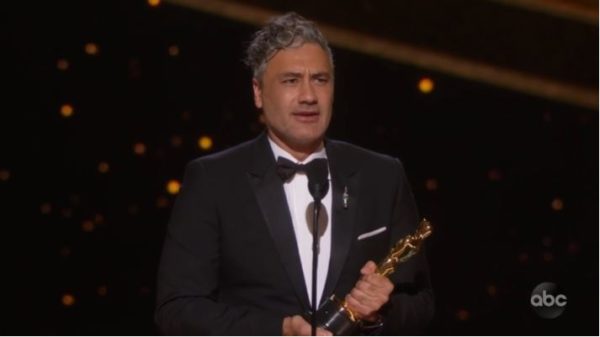
- Details
- By Rich Tupica
LOS ANGELES — Taika Waititi, a New Zealand director/actor, accepted the Academy Award last night in the Best Adapted Screenplay category for Jojo Rabbit, and his winner’s speech went beyond your typical “thank yous.” At the 92nd Oscars, held at the Dolby Theatre in Hollywood, the 44-year thoughtfully recognized not only his mother, producers and film crew, but also Indigenous people around the world.
“I dedicate this to all the indigenous kids in the world who want to do art and dance and write stories," he said in front of Hollywood-industry elites and millions of television viewers. “We are the original storytellers and we can make it here as well.”
Closing his speech, Waititi signed off with “kia ora,” a famous Māori phrase meaning “be safe.” He is the first Oscar winner of Māori decent. Māori are the tangata whenua, the indigenous people, of New Zealand. Later, the heartfelt nods continued when Waititi was introducing the winners of the Academy’s honorary prizes. That’s when he said: “The Academy would like to acknowledge that tonight we have gathered on the ancestral lands of the Tongva, the Tataviam, and the Chumash. We acknowledge them as the first peoples of this land on which the motion pictures community lives and works.” Watch his 2020 Oscar speech here.
Jojo Rabbit stars Roman Griffin Davis, Thomasin McKenzie and Scarlett Johansson. It was nominated for six Oscars, including Best Picture. This was Waititi’s third nomination.
More Stories Like This
Watermark Art Center to Host “Minwaajimowinan — Good Stories” ExhibitionMuseums Alaska Awards More Than $200,000 to 12 Cultural Organizations Statewide
Zuni Youth Enrichment Project Takes Top Emerging Artist Apprentices to Phoenix for Artistic Exploration and Cultural Immersion
From Dishwasher to Award-Winning Chef: Laguna Pueblo's Josh Aragon Serves Up Albuquerque's Best Green Chile Stew
Rob Reiner's Final Work as Producer Appears to Address MMIP Crisis
Help us defend tribal sovereignty.
At Native News Online, our mission is rooted in telling the stories that strengthen sovereignty and uplift Indigenous voices — not just at year’s end, but every single day.
Because of your generosity last year, we were able to keep our reporters on the ground in tribal communities, at national gatherings and in the halls of Congress — covering the issues that matter most to Indian Country: sovereignty, culture, education, health and economic opportunity.
That support sustained us through a tough year in 2025. Now, as we look to the year ahead, we need your help right now to ensure warrior journalism remains strong — reporting that defends tribal sovereignty, amplifies Native truth, and holds power accountable.
 The stakes couldn't be higher. Your support keeps Native voices heard, Native stories told and Native sovereignty defended.
The stakes couldn't be higher. Your support keeps Native voices heard, Native stories told and Native sovereignty defended.
Stand with Warrior Journalism today.
Levi Rickert (Potawatomi), Editor & Publisher
